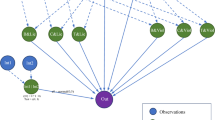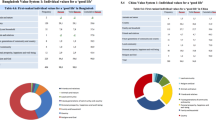Abstract
Arabs represent a major cultural group, yet one that is relatively neglected in cultural psychology. We hypothesized that Arab culture is characterized by a unique form of interdependence that is self-assertive. Arab cultural identity emerged historically in regions with harsh ecological and climatic environments, in which it was necessary to protect the survival of tribal groups. Individuals in Arabian cultures were honour-bound to be respectable and trustworthy group members. Supporting this hypothesis, study 1 found that Arabs were interdependent and holistic (like East Asians), but also self-assertive (like Westerners). This psychological profile was observed equally for both Muslim and Christian Arabs, thus ruling out Islamic religion as an alternative explanation for our findings. Studies 2 and 3 showed that the self-assertive tendency of Arabs is in service of interdependence, whereas that of Westerners is in service of independence. Our work contributes to the current effort by cultural psychologists to go beyond the prevailing East versus West, interdependence versus independence paradigm. It also speaks to the emerging socioecological perspective in cultural research.
This is a preview of subscription content, access via your institution
Access options
Access Nature and 54 other Nature Portfolio journals
Get Nature+, our best-value online-access subscription
$29.99 / 30 days
cancel any time
Subscribe to this journal
Receive 12 digital issues and online access to articles
$119.00 per year
only $9.92 per issue
Buy this article
- Purchase on Springer Link
- Instant access to full article PDF
Prices may be subject to local taxes which are calculated during checkout
Similar content being viewed by others
Data availability
All datasets are available through the following links: study 1a,b, https://www.dropbox.com/s/o9wclzjyvicp2ug/Study%201ab.sav?dl=0; study 2, https://www.dropbox.com/s/9m260jqyaa0mti6/Study%202.sav?dl=0; study 3, https://www.dropbox.com/s/guk2pbnz99pmy4b/study%203.sav?dl=0.
References
Nydell, M. K. Understanding Arabs: A Contemporary Guide to Arab Society (Nicholas Brealey, Boston, 2012).
Rodinson, M. Les Arabes 3rd edn (Presses Universitaires de France, Paris, 2002).
Hourani, A. A History of the Arab Peoples (Harvard Univ. Press, Cambridge, 1991).
Barakat, H. The Arab World: Society, Culture, and State (Univ. California Press, Berkeley, 1993).
Gilmore, D. D. Honor and Shame and the Unity of the Mediterranean (American Anthropological Association, Washington, 1987).
Gregg, G. S. The Middle East: A Cultural Psychology (Oxford Univ. Press, Oxford, 2005).
Al-Zahrani, S. S. A. & Kaplowitz, S. A. Attributional biases in individualistic and collectivistic cultures: a comparison of Americans with Saudis. Soc. Psychol. Q 56, 223–233 (1993).
Buda, R. & Elsayed-Elkhouly, S. M. Cultural differences between Arabs and Americans: individualism-collectivism revisited.J. Cross Cult. Psychol. 29, 487–492 (1998).
Aslani, S. et al. Dignity, face, and honor cultures: a study of negotiation strategy and outcomes in three cultures. J. Organiz. Behav. 37, 1178–1201 (2016).
Inglehart, R. & Baker, W. E. Modernization, cultural change, and the persistence of traditional values. Am. Sociol. Rev. 65, 19–51 (2000).
Schwartz, S. A theory of cultural value orientations: explication and applications. Comp. Sociol. 5, 137–182 (2006).
Hofstede, G. Culture’s Consequences (Sage, Beverly Hills, 1980).
Oyserman, D., Coon, H. M. & Kemmelmeier, M. Rethinking individualism and collectivism: evaluation of theoretical assumptions and meta-analysis. Psychol. Bull. 128, 3–72 (2002).
Kitayama, S., Park, H., Servincer, A. T., Karasawa, M. & Uskul, A. K. A cultural task analysis of implicit independence: comparing North America, West Europe, and East Asia. J. Pers. Soc. Psychol. 97, 236–255 (2009).
Heine, S. J., Lehman, D. R., Peng, K. & Greenholtz, J. What’s wrong with cross-cultural comparisons of subjective Likert scales: the reference-group problem. J. Pers. Soc. Psychol. 82, 903–918 (2002).
Kitayama, S. Cultural and basic psychological processes—toward a system view of culture: comment on Oyserman et al. Psychol. Bull. 128, 189–196 (2002).
Peng, K., Nisbett, R. E. & Wong, N. Validity problems of cross-cultural value comparison and possible solutions. Psychol. Methods 2, 329–341 (1997).
Cohen, A. B. Many forms of culture. Am. Psychol. 64, 194–204 (2009).
Gelfand, M. J. et al. Differences between tight and loose cultures: a 33-nation study. Science 332, 1100–1104 (2011).
Uskul, A. K., Kitayama, S. & Nisbett, R. E. Eco-cultural basis of cognition: farmers and fishermen are more holistic than herders. Proc. Natl Acad. Sci. USA 105, 8552–8556 (2008).
Talhelm, T. et al. Large-scale psychological differences within China explained by rice versus wheat agriculture. Science 344, 603–608 (2014).
Oishi, S. Socioecological psychology. Annu. Rev. Psychol. 65, 581–609 (2014).
Nisbett, R. E. et al. Culture and systems of thought: holistic versus analytic cognition. Psychol. Rev. 108, 291–310 (2001).
Markus, H. R. & Kitayama, S. Culture and the self: implications for cognition, emotion, and motivation. Psychol. Rev. 98, 224–253 (1991).
Armstrong, K. Muhammad: A Prophet for Our Time (Harper, London, 2006).
Ibn Khaldun, A. Z. Al-Muqaddimah [translated from Arabic] (Gallimard, Paris, 1377/2002).
Losleben, E. The Bedouin of the Middle East (Lerner Publications, Minneapolis, 2002).
Al Wardi, A. A Study Into the Nature of Iraqi Society (Al Warrak Publishing, Beirut, 1965).
Al Naqeeb, K. At the Beginning was Conflict: Issues Around Religion, Ethnicity, Nationhood, and Class in Arabs (Dar El Saqi, Beirut, 1997).
Sharabi, H. The Patriarchal System and the Problematic of Underdevelopment of the Arab Society (Center for Arab Unity Studies, Beirut, 1992).
Nisbett, R. E. & Cohen, D. Culture of Honor: The Psychology of Violence in the South (Westview Press, Boulder, 1996).
Maitner, A. T. et al. The impact of culture and identity on emotional reactions to insults. J. Cross Cult. Psychol. 48, 892–913 (2017).
Khroury-Kassabri, M. Masculine and family honor and youth violence: the moderating role of ethnic–cultural affiliation. Am. J. Orthopsychiatry 86, 519–526 (2016).
Gelfand, M. J. et al. Culture and getting to yes: the linguistic signature of creative agreements in the United States and Egypt. J. Organiz. Behav. 36, 967–989 (2015).
Gelfand, M. J. et al. The cultural contagion of conflict. Phil. Trans. R. Soc. B 367, 692–703 (2012).
Lancaster, W. The Rwala Bedouin Today (Cambridge Univ. Press, Cambridge, 1981).
Berque, J. in Maghreb, Histoire et Société (ed. Berque, J.) 22–34 (Duculot, Argel, 1974).
Bourdieu, P. Sociologie de l’Algérie (Presses Universitaires de France, Paris, 1958).
Heine, S. J. Cultural Psychology (W. W. Norton & Company, New York, 2014).
Henrich, J. et al. The weirdest people in the world? Behav. Brain Sci. 33, 61–83 (2010).
Masuda, T. & Nisbett, R. E. Attending holistically versus analytically: comparing the context sensitivity of Japanese and Americans. J. Pers. Soc. Psychol. 81, 922–934 (2001).
Triandis, H. C. Individualism and Collectivism (Westview Press, Boulder, 1995).
Kitayama, S., Mesquita, B. & Karasawa, M. Cultural affordances and emotional experience: socially engaging and disengaging emotions in Japan and the United States. J. Pers. Soc. Psychol. 91, 890–903 (2006).
Uchida, Y. & Kitayama, S. Happiness and unhappiness in east and west: themes and variations. Emotion 9, 441–456 (2009).
Heine, S. J. et al. Is there a universal need for positive self-regard? Psychol. Rev. 106, 766–794 (1999).
Kitayama, S. et al. Individual and collective processes in the construction of the self: self-enhancement in the United States and self-criticism in Japan. J. Pers. Soc. Psychol. 72, 1245–1267 (1997).
Kitayama, S. & Imada, T. in The Mind in Context (eds Feldman Barrett, L., Smith, E. & Mesquita, B.) Ch. 9 (Guilford Press, New York, 2010).
Shteynberg, G., Gelfand, M. J. & Kim, H. Peering into the ‘Magnum Mysterium’ of culture: the explanatory power of descriptive norms. J. Cross Cult. Psyhol. 40, 46–69 (2009).
Zou, X. et al. Culture as common sense: perceived consensus vs. personal beliefs as mechanisms of cultural influence. J. Pers. Soc. Psychol. 97, 579–597 (2009).
Na, J. et al. Cultural differences are not always reducible to individual differences. Proc. Natl Acad. Sci. USA 107, 6192–6197 (2010).
Nisbett, R. E. The Geography of Thought: How Asians and Westerners Think Differently and Why (Free Press, New York, 2003).
Miyamoto, Y. Culture and analytic versus holistic cognition: toward multilevel analysis of cultural influences. Adv. Exp. Soc. Psychol. 47, 131–188 (2013).
Norenzayan, A., Choi, I. & Peng, K. in Handbook of Cultural Psychology (eds Kitayama, S. & Cohen, D.) 569–594 (Guilford Press, New York, 2007).
Kitayama, S. et al. Perceiving an object and its context in different cultures: a cultural look at New Look. Psychol. Sci. 14, 201–206 (2003).
Morris, M. W. & Peng, K. Culture and cause: American and Chinese attributions for social and physical events. J. Pers. Soc. Psychol. 67, 949–971 (1994).
Duffy, S., Uchida, Y. & Kitayama, S. Symbolic Self-Inflation: a Cross-Cultural Comparison (Rutgers Univ. Press, Camden, 2008).
Corm, G. Le Liban Contemporain: Histoire et Société (Éditions La Découverte, Paris, 2003).
Trafimow, D. et al. Some tests of the distinction between the private self and the collective self. J. Pers. Soc. Psychol. 60, 649–655 (1991).
Faul, F. et al. Statistical power analyses using G*Power 3.1: tests for correlation and regression analyses. Behav. Res. Methods 41, 1149–1160 (2009).
Kruskal, W. H. & Wallis, W. A. Use of ranks in one-criterion variance analysis. J. Am. Stat. Assoc. 47, 583–621 (1952).
Siegel, S. & Castellan, N. J. Nonparametric Statistics for the Behavioral Sciences 2nd edn (McGraw-Hill, New York, 1988).
Kitayama, S., Ishii, K., Imada, T., Takemura, K. & Ramaswamy, J. Voluntary settlement and the spirit of independence: evidence from Japan’s “Northern frontier”. J. Pers. Soc. Psychol. 91, 369–384 (2006).
Oyserman, D. & Lee, S. W. S. Does culture influence what and how we think? Effects of priming individualism and collectivism. Psychol. Bull. 134, 311–342 (2008).
Acknowledgements
This research was supported by a grant from the INSEAD Research and Development Committee (we thank the INSEAD alumni fund for their support). We greatly appreciate H. Sayarh for authorizing and facilitating data collection in Morocco, K. Knio and M. S. Al-Zein for facilitating data collection in Lebanon, and A. Lisak for assisting with data collection in Israel. The funders had no role in study design, data collection and analysis, decision to publish or preparation of the manuscript.
Author information
Authors and Affiliations
Contributions
A.S.M., M.S., W.W.M. and S.K. designed the research. A.S.M., A.M. and S.T. collected the data. A.S.M. and S.T. analysed the data. A.S.M., M.S., W.W.M. and S.K. wrote the paper.
Corresponding author
Ethics declarations
Competing interests
The authors declare no competing interests.
Additional information
Publisher’s note: Springer Nature remains neutral with regard to jurisdictional claims in published maps and institutional affiliations.
Supplementary information
Supplementary Information
Supplementary Methods, Supplementary References 1–3, Supplementary Tables 1–3
Rights and permissions
About this article
Cite this article
San Martin, A., Sinaceur, M., Madi, A. et al. Self-assertive interdependence in Arab culture. Nat Hum Behav 2, 830–837 (2018). https://doi.org/10.1038/s41562-018-0435-z
Received:
Accepted:
Published:
Issue Date:
DOI: https://doi.org/10.1038/s41562-018-0435-z
This article is cited by
-
Evidence for cultural differences in affect during mother–infant interactions
Scientific Reports (2023)
-
Cultural and gender differences in social anxiety: The mediating role of self-construals and gender role identification
Current Psychology (2023)
-
Ethically Questionable Negotiation Strategies in South Asia: A Comparative Study of India and Pakistan
Group Decision and Negotiation (2023)
-
When norms collide: The effect of religious holidays on compliance with COVID guidelines
Journal of Public Health (2023)
-
Self-assertive interdependence in Mongolian culture: evidence from cognitive anthropology
Culture and Brain (2022)



